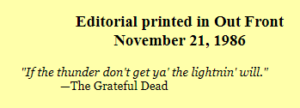 It has been over a year now since I had the AIDS virus antibody test and learned that I was positive and therefore infected with the virus that causes AIDS. Though I had anticipated that this would be the case, receiving the news and seeing the pink slip the results were on came as quite a jolt!
It has been over a year now since I had the AIDS virus antibody test and learned that I was positive and therefore infected with the virus that causes AIDS. Though I had anticipated that this would be the case, receiving the news and seeing the pink slip the results were on came as quite a jolt!
My immediate reaction wasn’t depression or anger, but rather that subtle form of guilt-tripping those of Irish Catholic background are particularly adept at, called “what if.” What if I had been born very well hung and was pursued vigorously for my sexual skills as a masterful top (by no means protection from infection)? What if I had not had that wonderful affair at age 16 with a man 20 years older? What if I had gone into the priesthood (again certainly no protection)? What if I hadn’t been having so much sex in 1979 and 1980? What if I hadn’t moved to Denver in 1972 but stayed in a small rural town? What if I had stayed with that lover in 1977? What if I was straight?. . . Though I still lapse into occasional fits of “what if” they are occurring with much less frequency.
What is proving more difficult to deal with than guilt is the occasional and at times nearly incapacitating rushes of AIDS ANXIETY—usually initiated by a very innocuous zit, an innocent ache or pain, or the dreaded “white tongue” following a night of rich food and too much wine. If I had a dollar for every time I’ve looked at my tongue in a mirror in the last year or felt those two lymph nodes in my neck, I could bankroll AIDS research well into the next century. I did follow the advice of the counselor who gave me my results and went to see a physician for a thorough physical exam. His reassurance that all was well and I was very healthy lasted about two days, although I think it is useful to be told by authority figures: “Get over it, Mary—you’ve got better things to do than worry yourself into an ulcer.”
What has worked for me is talking out my anxieties with close confidants. Make sure, though, that these are either professional people you are seeking out or trusted friends. Don’t start babbling about your fears related to infection with the AIDS virus on coffee break at work! People shunning you and flipping out don’t help. Neither does getting fired!
I think learning more about AIDS can help to a point, but I have to watch myself because I lapse at times into being an AIDS information junkie. I often snap out of these more severe episodes after several days. I fling myself into these educational orgies when the necessity for a fix of the latest AIDS information becomes overwhelming. It does help to put myself in a setting as far away from AIDS as possible. Going to the mountains with no books on AIDS, friends who can’t even spell it, and NO MIRRORS is very therapeutic.
It’s real hard to laugh about AIDS, but it is healing to laugh at yourself for looking at your tongue in the rear view mirror while parked in front of your house or copping a feel of that node, the action disguised as an innocent scratch behind the ear while buying milk at 7-11.
I do find myself appreciating the here and now in a way I never did a couple of years ago. I find myself going out of my way to do things for others and to say thaf’thank you” and to be sensitive to the trials and tribulations of those around me. Perhaps this is selfish bankrollingon my part for the future. If I get sick, I don’t want to be alone—I want people to care for me, worry about me, and bring me chicken soup. AIDS is also teaching me a deep appreciation for the oneness of all humanity—on a nitty-gritty level I find I have lots in common with a black, female, I.V. drug user from Manhattan.
Having worked closely with persons with AIDS and ARC over the last couple of years, I’ve learned a lot from them about myself— my fears and what makes me feel good. One of the greatest assets many gay men have is their phenomenal sense of irreverent humor. We are masters at satire and poking fun at the ridiculous, which is a tool to be used to appreciate the essential components of life. Many of our adversaries, the religious right for example, take themselves so seriously— but there is really no other choice for them. A one dimensional view of the world has no room for diversity and the growth-creating vitality that comes from looking at our daily dilemmas from a multiplicity of angles.
A couple of things I’m still working on philosophically and intellectually in my attempts to integrate infection with the AIDS virus into my life in a meaningful and non-incapacitating manner are: (1) Gay is not a cross to bear but a variation on a human theme to be celebrated and explored like all possibilities we are given. (2) Illness is not punishment but necessity—health has no meaning or relevance without it
What if I didn’t have this opportunity to richly focus on the moment? What if I wasn’t appreciating the similarities between myself and a nodding junkie with a needle in her arm in a downtown shooting gallery? What if my major concern was whether or not I could drive my car around in circles in Cheesman Park? What if. . .
Be Well!
